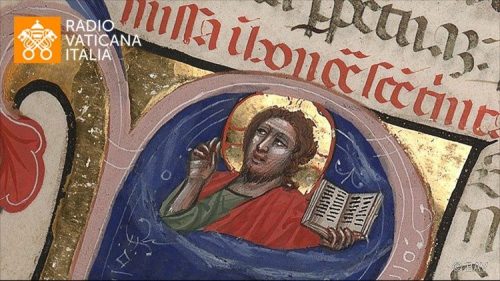READING OF THE DAY
JB 42:1-3, 5-6, 12-17
Job answered the LORD and said:
I know that you can do all things,
and that no purpose of yours can be hindered.
I have dealt with great things that I do not understand;
things too wonderful for me, which I cannot know.
I had heard of you by word of mouth,
but now my eye has seen you.
Therefore I disown what I have said,
and repent in dust and ashes.Thus the LORD blessed the latter days of Job
more than his earlier ones.
For he had fourteen thousand sheep, six thousand camels,
a thousand yoke of oxen, and a thousand she-asses.
And he had seven sons and three daughters,
of whom he called the first Jemimah,
the second Keziah, and the third Kerenhappuch.
In all the land no other women were as beautiful
as the daughters of Job;
and their father gave them an inheritance
along with their brothers.
After this, Job lived a hundred and forty years;
and he saw his children, his grandchildren,
and even his great-grandchildren.
Then Job died, old and full of years.
GOSPEL OF THE DAY
LK 10:17-24
The seventy-two disciples returned rejoicing and said to Jesus,
“Lord, even the demons are subject to us because of your name.”
Jesus said, “I have observed Satan fall like lightning from the sky.
Behold, I have given you the power
‘to tread upon serpents’ and scorpions
and upon the full force of the enemy
and nothing will harm you.
Nevertheless, do not rejoice because the spirits are subject to you,
but rejoice because your names are written in heaven.”At that very moment he rejoiced in the Holy Spirit and said,
“I give you praise, Father, Lord of heaven and earth,
for although you have hidden these things
from the wise and the learned
you have revealed them to the childlike.
Yes, Father, such has been your gracious will.
All things have been handed over to me by my Father.
No one knows who the Son is except the Father,
and who the Father is except the Son
and anyone to whom the Son wishes to reveal him.”Turning to the disciples in private he said,
“Blessed are the eyes that see what you see.
For I say to you,
many prophets and kings desired to see what you see,
but did not see it,
and to hear what you hear, but did not hear it.”
WORDS OF THE HOLY FATHER
The Church’s true mission is not to develop an efficient aid mechanism, modelled after an NGO. The profile of an apostle — who in simplicity and poverty proclaims the Gospel with the one true power that comes from God — is recognized instead in the plain words that Jesus recommends to the disciples returning with joy from their mission: “we are unworthy servants”. And thus, at Mass at Santa Marta […] the Pope reaffirmed that the true mission of the Church is “healing the wounds of the heart, opening doors, forgiving all, liberating, and saying that God is good, forgives all, is Father, God is gentle and always waits for us”.
In the passage from the Gospel according to Mark (6:7-13) offered in today’s liturgy, the Pontiff began, “we heard that Jesus called his disciples” and sent them “to take the Gospel: it is He who calls”. The Gospel recounts that He called them to Him, sent them and gave them power. In the vocation of the disciples, the Lord gives power: the power to cast out impure spirits, to liberate, to heal. This is the power that Jesus gives”. Indeed, He “does not give the power to manoeuvre or to build large companies”; but “the power, the same power that He had, the power that He received from the Father, he conveys to them”. And He does so with “plain advice: go into the community, but do not take anything for the journey except a staff; no bread, no bag, no money… in poverty!”.
The Gospel, Francis stated, “is so very rich and so powerful that it does not need to create large firms, big companies, in order to be proclaimed”. For the Gospel “should be proclaimed in poverty, and a real pastor is one who goes like Jesus: poor, to proclaim the Gospel, with that power”. And “when the Gospel is safeguarded with this simplicity, with this poverty, one clearly sees that salvation is not a theology of prosperity” but rather “a gift, the same gift that Jesus had received in order to give”.
Francis again proposed “that most beautiful scene in the Synagogue, when Jesus introduces Himself: ‘I was sent to bring salvation, to bring glad tidings to the poor, liberation to the incarcerated, to the blind the gift of sight. Liberation to all those who are oppressed and to proclaim the year of grace, the year of joy’. This”, the Pope said, is precisely “the aim of the Gospel message, without many curious, worldly things”. This is how Jesus conveys it.
And what, the Pope asked, does Jesus “command” the disciples to do, “what is his pastoral plan?”. It is simply to “cure, heal, raise, liberate, cast out demons: this is the simple plan”. It coincides, Francis pointed out, with “the mission of the Church: the Church which heals, which cures”. Such that, he recalled, “a few times I have spoken of the Church as a field hospital: it’s true! How many wounded there are, how many wounded! How many people who need their wounds to be healed!”.
Thus, the Pope continued, “this is the Church’s mission: healing the wounds of the heart, opening doors, liberating, and saying that God is good, that God forgives all, that God is Father, that God is gentle, that God always waits for us”.
Referring to the Gospel of Luke (10:17-20), the Pontiff remarked that “the disciples returned with joy” from their mission, because “they didn’t believe they would have succeeded”. And “they said to the Lord: ‘Lord, even the demons left!”. They were “joyful because this power of Jesus, employed with simplicity, with poverty, with love, produced a good result”.
The very phrase that Jesus addressed to the joyful disciples, according to the Gospel, “explains everything”. They recounted: “We did this, and this, and this, and this…”. Thus, after listening to them, Jesus closes his eyes and says: “I saw Satan fall like lightening from heaven”. The words reveal “the struggle of the Church: it’s true, we should get help and create aid organizations, for the Lord gives us gifts for this”; but, the Pope warned, “when we forget this mission, forget about poverty, forget apostolic zeal and put our hope in these means, the Church slowly lapses into anngoand becomes a fine organization: powerful but not evangelical, because that spirit is lacking, that poverty, that healing power”.
There is more: on their return, Jesus brings the disciples with Him “to rest a little, to have a day in the country, to have sandwiches and soft drinks”. The Lord wants “to spend a little time together to celebrate”. And together they talk about the mission they have just done. But Jesus doesn’t tell them: ‘You’re great, eh! Now let’s plan things better for the next excursion!’. He limits Himself to recommending: ‘When you have done all that is commanded you, say, We are unworthy servants’” (Lk 17:10).
In these words, Francis remarked, the Lord described the profile of an apostle. Indeed, “what would be the greatest praise for an apostle?”. The answer: “He was a labourer for the Kingdom, he was a worker for the Kingdom”. Indeed, “this is the highest praise, because he goes on Jesus’ path of proclamation, he goes to heal, to safeguard, to proclaim these glad tidings and this year of grace. To enable the people to find the Father once again, to make peace in the peoples’ hearts”.
The Pope concluded with an invitation to read this Gospel passage, emphasizing “the most important things to Jesus, in proclaiming the Gospel: they are these, these small virtues”. And “then it is He, it is the Holy Spirit who does it all”.
(Santa Marta, 5 February 2015)

